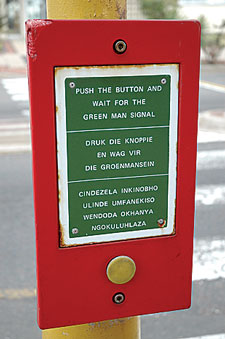A question that's big in South Africa at the moment is this: which language should we do our Christianity in?
It's a question faced right across society. In Johannesburg at least, most signs and billboards are in English. Ninety per cent of books in bookshops are in English and most of the higher education institutions are English medium. But only 20 per cent of Jozi's population speak English at home.
In our church there's people from all 11 language groups, as well as French- and Portuguese-speakers from elsewhere in Africa. So which language do we use?
It's tricky. Most black African people in Jo'burg will speak Zulu " and that's the language they'll mostly use for jokes and friendship. But even though they'll understand it, Tswanas, Sothos, Pedis and everyone else will often resent Zulu being perceived as the first among the indigenous languages. Plus, if you preach in Zulu, 99 per cent of the whites won't have a clue what's going on.
Plenty of people speak Afrikaans " and proudly " and with the former Randse Afrikaanse Universiteit (now the dual-medium University of Johannesburg) down the road it could make sense. But for many black South Africans the language is still linked with oppression and apartheid. So if you want to be a multicultural church in Johannesburg, it looks like English is your best option.
But it's still complicated. A couple of weeks ago I ran a seminar on William Tyndale " the translator of the first full English New Testament " and staged a debate on whether South Africans should be reading the Bible in their home languages.
 The debate was fierce: some students felt frustrated that the language in their vernacular translations was archaic " a kind of King James Zulu. Others felt annoyed that because of a limited education system, many don't even know their home languages well enough to read them. One student expressed shock after making the discovery that despite getting top marks in high school in Sepedi, four years at an English-speaking university had left him unable to read his Sepedi Bible out loud to his mother. And every single student in the room " none of them native English-speakers " read the Bible for themselves in English.
The debate was fierce: some students felt frustrated that the language in their vernacular translations was archaic " a kind of King James Zulu. Others felt annoyed that because of a limited education system, many don't even know their home languages well enough to read them. One student expressed shock after making the discovery that despite getting top marks in high school in Sepedi, four years at an English-speaking university had left him unable to read his Sepedi Bible out loud to his mother. And every single student in the room " none of them native English-speakers " read the Bible for themselves in English.
This all has large implications for the future of the South African church. Muslim proselytisers claim proudly that Islam is far more African than Christianity. African sangomas ("witch doctors') will insist that Christianity just "came with the sheep': the gospel is an un-African intruder. Jesus is just another white guy come to oppress you, people will say.
So, though most of our service is in English, we try to sing African songs " white and black " and encourage people to pray upfront in their home languages. But it's only a small start.






















